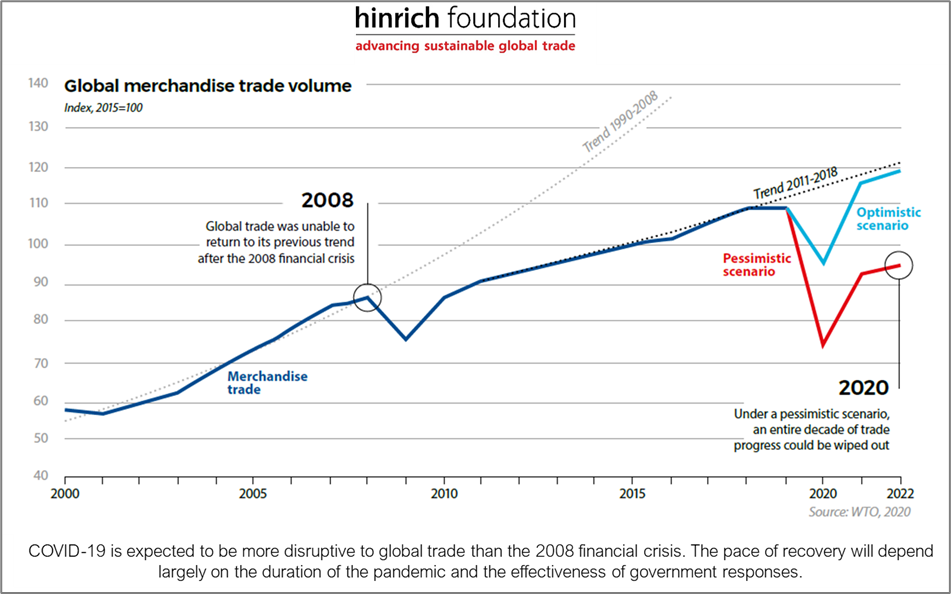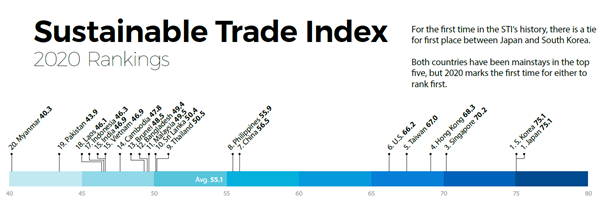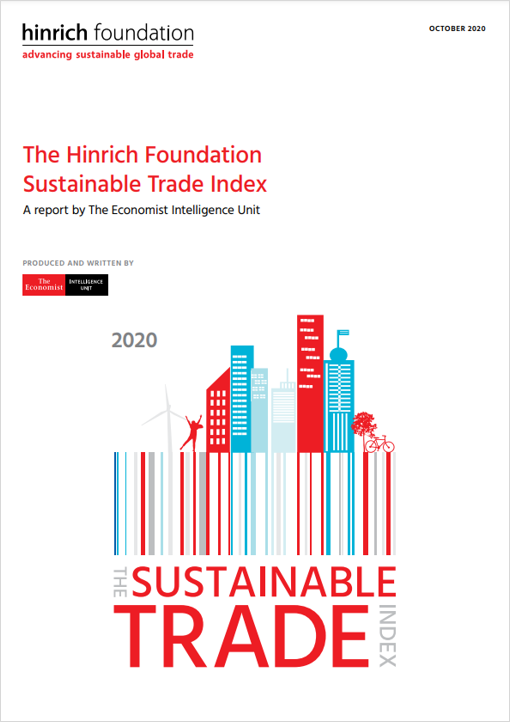Sustainable Trade Index 2020: Four policy priorities to rebuild economies sustainably
Published 27 October 2020 | 10 minute read
The Hinrich Foundation today released the third edition of its bi-annual Sustainable Trade Index, commissioned to the Economist Intelligence Unit. Besides evaluating the capacity of 20 Indo-Pacific economies for sustainable trade, this index also examines the importance of sustainable trade for building more resilient economies and communities in the future.
“The Covid-19 pandemic has provided a stark and painful reminder of why the concept of sustainable trade is so critical” said Merle A. Hinrich, Founder and Chairman of the Hinrich Foundation. “Imbalanced trade practices have played a key role in aggravating the health, economic and social outcomes of the pandemic. It is now crucial for Asia to strike a balance between short-term goals and long-term resilience—especially as it looks to recover from Covid-19.”
Covid-19 is expected to be more disruptive to global trade than the 2008 financial crisis. The pace of recovery will depend largely on the duration of the pandemic and the effectiveness of government responses.
According to Merle A. Hinrich: “For all the damage that Covid-19 has caused, it has also presented the world with an opportunity to emerge stronger than before”.

Key recommendations building more resilient economies and communities
The primary principle which underpins sustainable trade is balance – balance between economic goals and the need to strengthen social capital and environmental stewardship. Trade cannot be pursued solely on the basis of economic gains. The pandemic has highlighted the importance of balancing these goals, especially as we endeavour to build back better.
Countries that have allowed their trade relationships to become overly dependent in pursuit of the greatest economic gains have found themselves in highly vulnerable situations. This was most dramatically illustrated in the case of medical supplies and medicines but in the early days of the pandemic, automotive factories in South Korea also had to shut down when factory closures in China cut off their only supply of a single intermediary component. It is now acknowledged as well that rapid deforestation and poor environmental resource management have elevated the risks of zoonotic diseases such as Covid-19.
While the original intention behind the STI was not necessarily to serve as a tool for crisis prevention, it has now taken on that dimension. The Index 2020 identifies four areas policymakers, business leaders and NGOs should address for building back better in a post pandemic world:
- Reducing inequality. International trade has been a driving force behind decades of economic growth in Asia. The region has lifted 1.3 billion people out of poverty by capitalizing on a more integrated global economy. However, according to the IMF, the pandemic could reverse up to 30 years of progress in fighting poverty and the numbers of “new poor” and very poor are now rising very rapidly. Unless significant steps are taken now to address the issue, the gap between rich and poor will only widen further when the next crisis comes, making sustainable trade all the more difficult.
- Improving education. Without progress in education, many countries in the STI may find themselves left behind, particularly as trade digitalization progresses.
- (Re)lowering barriers to trade and investment. None of the developing countries (in the STI) have the internal demand or the capital base to grow, let alone grow in a manner that will alleviate poverty and create a middle class. Trading, and trading sustainably, are really their only paths. That means keeping their economies open and welcoming the kind of foreign investment that supports those goals.
- Building on the environmental benefits of the pandemic. Governments have an opportunity to apply the environmental lessons learned from the crisis to their policy decisions and ask themselves questions about how to retain the gains already made. In particular, they will need to confront the question of how to build upon and accelerate the drop in emissions that the world will see in 2020.
Key index results
Besides outlining recommendations for more sustainable trade, STI results show:
- For the first time in the STI’s history, there is a tie for first place between Japan and South Korea. Both countries have been mainstays in the top five, but 2020 marks the first time for either to rank first.
- America’s protectionist stance on trade prevented it from reaching the top five. Between Oct 2018 - Nov 2019, the US enacted 841 tariffs and 1430 non-tariff barriers.
- China’s overall score was also held back by its poor performance in the social pillar, primarily due to human trafficking.
- India, the world’s fifth largest economy fell two spots in the overall rankings from 2018. Aside from a lack of infrastructure, India’s low education coverage is identified as a critical issue for sustainable trade when roughly 700-800 million people do not have access to a tertiary education, in a context of accelerated trade digitalization.
- Finally, the most notable move in the index was in Vietnam. After making progress in previous editions of STI, there was backsliding relative to other countries in the index in the social and environmental pillars. That dragged its rank to 16th overall, just behind in India and just ahead of Indonesia. For a country that is becoming the next hub of supply chains in the Asian region, that is not an encouraging development.

The index workbook, whitepaper and infographic that are being published can all be found on this page.
***
Notes to editors
The Hinrich Foundation commissioned The Economist Intelligence Unit in 2016 to construct this bi-annual index. The Hinrich Foundation Sustainable Trade Index measures the capacity of 20 economies—including 19 in Asia, and the US as an external benchmark—to participate in the international trading system in a manner that supports the long-term domestic and global goals of economic growth, environmental protection and strengthened social capital. This readiness for sustainable trade is evaluated across 27 indicators grouped under each of the three pillars of sustainability: economic, social, and environmental. The 2020 edition of the index is the 3rd, following the 2016 and 2018 versions. The Index aims to stimulate meaningful discussions of the full range of considerations when advancing sustainable trade. A full explanation of the index methodology can be found in the appendix of the main report.
About the Hinrich Foundation
The Hinrich Foundation is an Asia based philanthropic organization that works to advance mutually beneficial and sustainable global trade. It supports original research and education programs that build understanding and leadership in global trade. Its team of global trade experts and practitioners apply their deep knowledge and experience in trade, economics, policymaking and education to deliver the Foundation’s programs.
About The Economist Intelligence Unit
The Economist Intelligence Unit is the world leader in global business intelligence. It is the business-to-business arm of The Economist Group, which publishes The Economist newspaper. The Economist Intelligence Unit helps executives make better decisions by providing timely, reliable and impartial analysis on worldwide market trends and business strategies. More information can be found at www.eiu.com.
© The Hinrich Foundation. See our website Terms and conditions for our copyright and reprint policy. All statements of fact and the views, conclusions and recommendations expressed in this publication are the sole responsibility of the author(s).
